Hanging from helicopters, tackling rapids in canoes and trekking to perilous remote peaks in a bid to find a rare plant may sound like the plot of an action movie.
But every day, London's Kew Gardens' very own team of adventurers are working hard to help save the planet.
From rescuing seeds to researching the Middle East’s salt tolerant plant life — which will help restore communities hit by future climate disasters — the botanists’ work is vital to future food security.
To the public, the serene, picturesque Royal Botanic Gardens in Richmond and its sister venue, Wakehurst in Sussex, provide a tranquil escape from the stresses of everyday life.
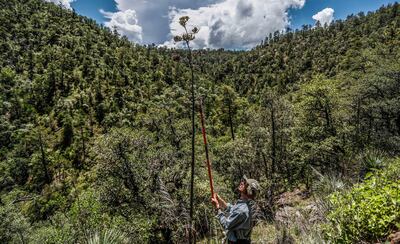
But hidden deep below ground at Wakehurst, under the cover of the UK’s largest Christmas tree and ancient medieval Yew, lies a secret bunker which one day may help save humanity from extinction.
Its vast network of impenetrable underground vaults, built to withstand floods, bomb blasts and radiation, holds more than 2.4 billion seeds collected from across the world by the Kew Gardens international team
From the deserts of Oman to war-torn Syria, botanists from the Millennium Seed Bank Partnership at Kew are travelling around the globe to ensure that the world’s plant life is conserved for future generations.
Two in five plant species at risk of extinction
With two in five plant species at risk of extinction, the botanists are facing a daily race against time.
Dr Aisyah Faruk has been at Kew for six years and has witnessed first-hand the perils facing the plant world.
“Since I started, the list of endangered species that have been flagged in the wild has increased and it’s an indication things are getting worse,” she told The National.

“The number of plants on the list Is getting more and more dire and higher. The figures haven’t been plucked from the air; they are from experts on the ground who are seeing species being decimated.
“It is an extremely important job they are doing highlighting it and the work we are doing to help. They go out to particular areas where previously we have seen certain species and they have found they are not there any more. Sometimes they were the last of a population.”
Dr Faruk and her colleagues travel the world to recover seeds to be stored at Kew.
Priority is given to areas that are vulnerable to climate change and plants which are vital for people’s livelihoods.
Royal Botanic Gardens, Kew
More than 40,000 seeds in its vaults are from species that face imminent extinction.
“We work with in-country partners to identify areas for conservation of flora. They lead the programmes and we provide them with expertise and training and anything they require to carry out the work,” she said.
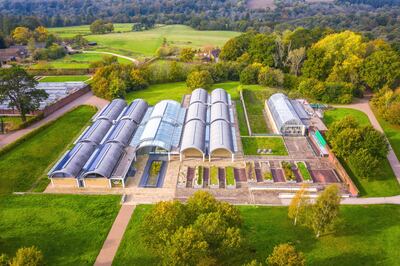
“We have to use canoes sometimes to try to access the plants. I regularly get emails from colleagues in canoes, hanging out of helicopters and off cliffs. It can be quite treacherous sometimes, even in the UK there are some very remote places we have to access, especially in Scotland.
“When the seeds arrive in the UK we have to put them in a drying room and then we freeze them at -20C to keep them going for decades.
“There needs to be duplicate collections to ensure there is an extra safeguard in case one is destroyed, so they send us a proportion of the seeds.
“The nations are essentially the donors and they own the seeds and we are just the guardians of the species and collections.”
Restoring plants wiped out in Australia bushfires
The vital collections at Kew have already helped restore thousands of plants which had been wiped out.
“We have been able to dispatch around 12,000 back to nations who needed them for restoration,” Dr Faruk said.
“In the UK, we reintroduced endangered buttercups in Gloucestershire. They were critically endangered and at risk of becoming extinct in the wild.”
The 2019 bushfires in Australia destroyed endangered peas and when the nation ran out of spare seeds, it looked to Kew to help provide more.
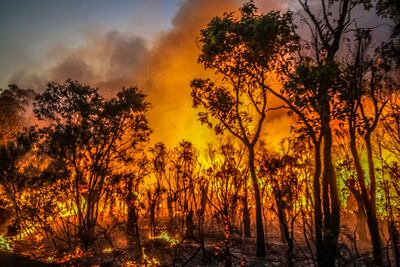
“In 2007, we had originally collected 1,000 seeds from there. Australia said it had run out of seeds and one of the areas they needed to restore was from the specimens we had. We sent 250 seeds and a few months later, they reported that 90 per cent of them had germinated.
“It was a fantastic feeling to know that our work has helped to restore an endangered species and prevented it from being wiped out.”
Middle East plants vital to world’s future food security
As well as collecting seeds, Kew’s botanists are carrying out global research into protecting and preserving important food and medicine sources — and the Middle East is key to these projects.
Dr Faruk’s colleague, Pablo Gomez Barreiro, has been carrying out research on medicinal plants grown in Jordan and Lebanon.
As part of Kew’s project on restoring the traditional Mediterranean diet through the conservation of wild edible plants, Mr Gomez Barreiro liaised with the National Agricultural Research Centre in Jordan and the Shouf Biosphere Reserve in Lebanon to learn about their wild edible plants and fungi.
One of his discoveries was Akkoub, Gundelia tournefortii.
“Native and restricted to the Middle East region, Akkoub is an edible and medicinal thistlelike plant that grows almost exclusively on undisturbed rocky soils,” he said.
“Local gatherers, sometimes even whole families, swarm the hills in search of this spiny plant either for fun, personal use or economic benefit. This activity, however, drastically reduces seed availability. It affects the plant’s reproduction and therefore its survival, which is why conservation and sustainable cultivation and use of this species is crucial.
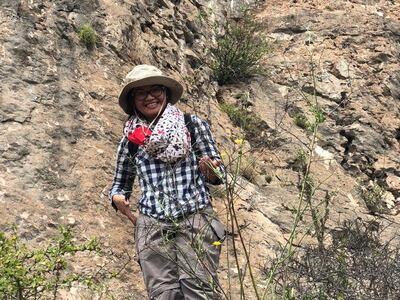
“One of our main goals is to investigate the chemical composition, nutritional value and variation across the Akkoub populations in Jordan and Lebanon, using state-of-the-art analytical methods at Kew.
“We also want to understand more about the seed germination of Akkoub for the cultivation of plants. Together, this scientific knowledge will provide incentives to sustainably cultivate Akkoub, reducing the pressure on wild populations so they do not become endangered due to overharvesting.”
Dr Faruk has worked in Oman gathering seeds from desert and forest locations, working with the nation’s new Oman Botanic Garden in Muscat.
“We have a project looking at the medicinal plants from the Middle East to ensure that important economic and cultural plants are conserved for the future,” she said.
“We have spent time showing the local community how to propagate them and safeguard them from extinction.
“I recently visited Oman’s botanic garden, they are a fantastic group of people, really focused on highlighting their natural species and raising awareness of the need to preserve their native flora. They have a fantastic landscape, which is very varied.”
UAE’s salt-tolerant plants could aid communities affected by rising sea levels
Salt-tolerant plants, which grow in the UAE’s arid environment, are being researched by Kew’s Dr Charlotte Seal as part of the Adapt Our Culture to Climate Change project.
With rising sea levels due to climate change, these plants could hold the key to helping communities that face having their food sources wiped out due to their need for water resources.
“The UAE is of interest to Dr Seal, particularly with regards to her work on salt-tolerant plants in coastal habitats, such as mangroves and salt marshes, which are at risk from sea level rise through climate change,” Dr Faruk said.
“These coastal habitats are also important for blue carbon storage. Her team is researching salt thresholds to germination across species, as some halophytes can germinate in twice the concentration of seawater and others prefer just water.
“It’s important work because with sea levels rising and changes in the climate causing droughts, salt-tolerant plants will be important in the future for food and restoration work across the globe.
“We need to know what plants to plant where and identify areas and what will be able to grow in a specific place and capture carbon. Plants from the UAE will be vitally important.”
Previously, researchers Fawzi Karim and Abdullah Dakheel of the International Centre for Biosaline Agriculture in Dubai, identified 145 plants, used for food, fuel and medicines in the UAE that can grow using saline underground water.
They include medicinal plants used in the treatment of diabetes, high blood pressure and heart disease and foods such as carrots, melons, onions and tomatoes.
Kew’s experts are also working with the Lebanese Agricultural Research lnstitute, carrying out research on crops.
“We are studying wheat and barley crops,” Dr Faruk said.
“We grow the seeds and do a lot of research on making them more resilient to climate change.
“We do a lot of research on plant health on trying to make them more resistant to diseases.”
Botanists work in war-torn countries to save plants
Lebanon, along with Morocco, has helped with rescue effort to save seeds from war-torn areas.
Botanists at Syria’s International Centre for Agricultural Research in the Dry Areas managed to safely duplicate more than 80 per cent of its collection before the last staff fled in 2014.
After relocating to Lebanon, the team rebuilt its collection.
“In Syria, the botanists were amazing and ensured their native species were transported out of the country and stored in a safe place until restoration work can happen,” Dr Faruk said.
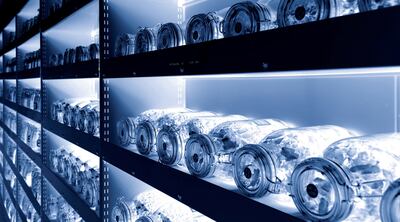
“It is extremely difficult to do work with war-torn countries, but we still continue to do all we can.”
With fewer than 10 per cent of plant species having so far been assessed for the global International Union for Conservation of Nature Red List of Threatened Species, the work of Dr Faruk and her colleagues remains an uphill struggle.
“I’m passionate about conserving our natural world,” she said.
“My work is extremely rewarding in lots of different ways. When seeds come in, I always get a rush to see what has arrived.
“We face major challenges as more species become endangered but every species matters and we will continue to train our partners across the world to help us protect them.”

